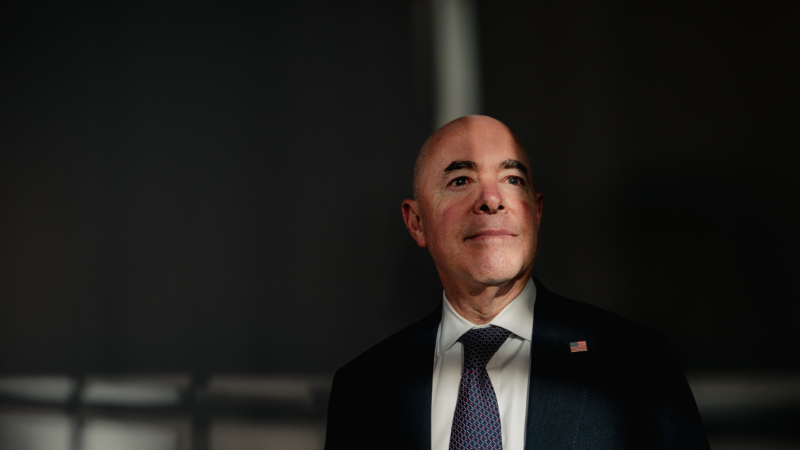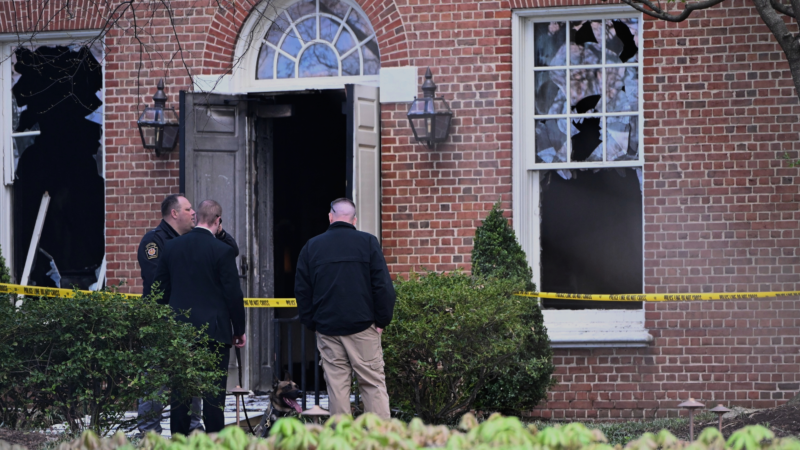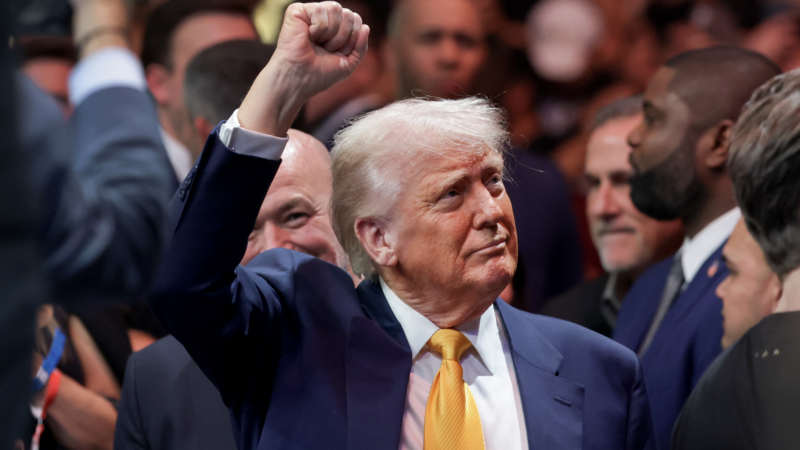Departing DHS Secretary Mayorkas contends he delivered border security in the end
Secretary of Homeland Security Alejandro Mayorkas is talking about what went wrong, and making a case for what went right on his watch during the Biden administration.
Mayorkas will step down next week after four contentious years as DHS secretary come to an end.
His sprawling department encompasses everything from the Coast Guard to the Secret Service—and also border protection and immigration enforcement agencies. That put Mayorkas at the center of a ferocious immigration debate that was a major issue in the election that Democrats lost in 2024.
Mayorkas spoke about how immigration played a role in that defeat with NPR.
“In terms of the narrative, I don’t think we prevailed in communicating to the American people successfully the challenges of migration at an historic level since World War II,” he told Morning Edition‘s Steve Inskeep.
Mayorkas did not criticize administration policies, but alluded to disagreements within the Biden White House over what to do—saying there are “differences of opinion” but that “once a decision is made, we all move forward as one team. And that is indeed what we have done and will continue to do until this administration comes to a close.”
The number of migrants and asylum seekers peaked at the U.S. southern border in December 2023. Mayorkas blamed circumstances beyond the administration’s control, but Republicans blamed Mayorkas, and the House impeached him in early 2024. The Senate rejected both articles of impeachment after the House’s narrow vote.
President Biden later took executive actions in June making it easier to block asylum seekers. And as the administration departs, Mayorkas says fewer people are crossing these days, than during parts of the first Trump administration.
“The border right now is more secure than it was at the end of 2019, the last year before the pandemic struck,” Mayorkas said.

He added that deportations are up sharply in the past year. In short, the departing secretary suggested that he has already delivered on much of the security that President-elect Donald Trump promised.
Mayorkas reflected on border enforcement, DHS staffing needs, foreign terrorism and domestic extremism.
This interview has been lightly edited for length and clarity.
Inskeep: Let’s start at the border. In what state, in your view, are you leaving the border for the next administration?
Mayorkas: The border right now is more secure than it was at the end of 2019, the last year before the pandemic struck. The number of individuals encountered at the border on a daily basis is lower than it was at that time, and that has been consistently the case now for approximately six months.
Inskeep: Some people will just not believe that. Let’s go through the numbers. There was a peak in late 2023, right? And then they began declining—The numbers of people encountered each month—is that correct?
Mayorkas: In late 2023, December, specifically, we reached a peak among the four years of this administration, and that was directly attributable to the fact that in that month the Mexican enforcement agency, IME, was unfunded. It did not have funds. And people might recall that as a result of that, the president dispatched Secretary Blinken and me to Mexico to meet with the president and members of his cabinet to speak of the imperative of funding the enforcement agency. It’s as though we did not have any Border Patrol presence on our side of the border. There was no interdiction of migrants seeking to reach the southern border between the United States and Mexico. President Lopez Obrador, in fact, funded the enforcement agency. There were interdiction efforts resumed and the numbers dropped. But the most precipitous drop really occurred upon our swift and effective implementation of the President’s proclamation in June of 2024 that restricted the ability of individuals to claim asylum at our southern border.

Inskeep: Up until 2023, though, you had gradually, steadily, in fact, dramatically increasing numbers. And people will ask why you did not act sooner. If it was within your power, as it turned out, to drastically reduce the number of people crossing, why not do that years earlier?
Mayorkas: The answer is multipart. Remember where we were up until May of 2023. In the first part of our administration, we were climbing out of the COVID-19 pandemic. Once we did that and it was not, of course, instantaneous. It took time. There was a tremendous amount of pressure on both sides of the aisle to maintain the public health order under Title 42 of the United States code, a public health provision because people were concerned that we were not yet out of the woods in our fight against the pandemic.
Inskeep: That people with COVID would cross the border?
Mayorkas: Or quite frankly, that we could be infected, people could cross the border infected, and it could spin out of control. In May of 2023, the Title 42 public health order was lifted. We turned very quickly to Congress to seek supplemental funding of a woefully underfunded and perennially underfunded immigration system. We did not succeed in gaining additional funds. Funds for additional Border Patrol agents, Immigration and Customs Enforcement officers, asylum officers, immigration judges. The administration tried a second time to obtain supplemental funding. Again, Congress did not provide it, and we turned quickly into our bipartisan Senate negotiations for legislation which proved successful until they were politically torpedoed. So that is one important element of the answer. At the same time, Steve, we had to put elements in place to effectively implement and swiftly implement the President’s June 2024 proclamation, which we did. We had worked with countries in the region to accept the return of their nationals, not only to accept the return, but to accept the return more swiftly and more readily. We built lawful pathways to provide alternative ways of people reaching the United States who are qualified to do so. We built new labor pathways with Canada, Spain and others. We negotiated agreements with countries outside of our hemisphere, across the Atlantic to impose restrictions on the migratory path. A whole suite of measures that enabled us ultimately to so swiftly and effectively implement the President’s proclamation. So it’s a combination of factors.

Inskeep: Do you think that on some level the administration lost the narrative on this, however? Politically, this was a loser throughout the administration, this issue.
Mayorkas: So it’s not for me to comment on the politics. But in terms of the narrative, I don’t think we prevailed in communicating to the American people successfully the challenges of migration at a and at an historic level since World War II. The challenge of our southern border was not unique to the United States. In my bilateral and multilateral engagements with other countries around the world, they spoke of the challenges of migration they themselves were enduring. We have a level of displacement of people in the Western Hemisphere and in the world that is in fact the greatest in about 80 years.
Inskeep: So you acknowledge you didn’t communicate as well as you would have liked to. When you look back, what would you have done differently?
Mayorkas: You know, I am a big believer, Steve, that the front windshield is bigger than the rearview mirror for a reason. We look forward. We provide our input to those who will govern in the future, and we move forward. But there’s no question that the narrative was not a successful one.
Inskeep: That said, I study history, so I look in the rearview from time to time.
Mayorkas: As do I.
Inskeep: When you do look from time to time, is there anything you regret about the way that you did this job on immigration specifically?
Mayorkas: I would say the following, Steve. You know, there are differences of opinion on many complex and challenging issues. Immigration is no different in that regard. Once a decision is made, we all move forward as one team. And that is indeed what we have done and will continue to do until this administration comes to a close.
Inskeep: Because the number of encounters has declined so sharply. And we should emphasize still thousands of people, but it’s like less than a third of what it was. Are you willing to say to the incoming administration?
Mayorkas: It’s actually below a thousand quite often and sometimes above a thousand, you.
Inskeep: You mean per day?
Mayorkas: But remember, in 2018, and I’ll be approximate in my numbers, in 2018 there were about 550,000 to 560,000 individuals encountered at the southern border. Throughout the year in 2019, that number was almost double. And so what has driven displacement around the world did not begin in 2021. We saw it climbing from the 2018 to 2019 period. And then, of course, COVID hit.
Inskeep: Are you at the point where you might be willing to hand the border over to the next administration and say, actually, the problem is sort of solved? We’ve done this for you.
Mayorkas: I would say that the model that we have built of restricting asylum at our southern border and building accessible, lawful, safe and orderly pathways for individuals to seek relief under our laws is the model that should be sustained. And we have delivered the border and those accessible pathways to the incoming administration. And that’s with respect to the border. We then have the challenge of individuals already present in the United States who avail themselves of the court process, the immigration court process. And when they don’t succeed, they are subject to removal and that process needs to continue.

Inskeep: How many people have you deported, say, in the last year?
Mayorkas: I believe the number is well over 250,000. A very significant number.
Inskeep: Is that higher than it would have been a few years ago?
Mayorkas: Yes, it is. And we have built that capacity and we’ve built those processes.
Inskeep: And I’m just trying to think about what is necessary, from a layman’s perspective, to have capacity. You need agents, you need courts, you need court rulings. You need airplanes in some cases or buses you need a country to ship them to one that will take them.
Mayorkas: Transportation assets, personnel and personnel across the spectrum of the system, individuals to apprehend. We also need facilities in which to detain individuals. We need immigration court judges. We need legal personnel to represent the government in proceedings. And so it is a woefully underfunded system. And so if the administration that is coming in intends to execute on what it has articulated publicly, it will need substantial additional resources to do so.
Inskeep: The president-elect has talked about a mass deportation. He’s been general or vague about exactly what that means. And people around him give different definitions. As someone who knows the law, as someone who knows the systems, what is practical?
Mayorkas: Well, I believe the border czar Tom Homan, with whom I have worked in the past in the Department of Homeland Security, has spoken of prioritizing individuals unlawfully present in the United States who pose a public safety or national security risk. If that is indeed the case, and that will hold, that is precisely what we have been doing and have done.
Inskeep: I want to underline that, you’re saying that they’re promising to do the thing that you’re already doing?
Mayorkas: On Sept. 30, 2021, I issued immigration enforcement guidelines that identified categories of individuals for a prioritized enforcement effort because our resources are not sufficient to remove everyone who is unlawfully present. We have more than 12 million undocumented individuals in the United States. And so the priorities I set were the priorities that have been set in the past. Individuals who pose a threat to our national security. Individuals who pose a threat to our public safety. And individuals who pose a threat to our border security.

Inskeep: What about someone who’s committed a crime? Are they automatically considered someone who poses a threat?
Mayorkas: I think there are a number of factors. It depends on the crime. What if, for example, it’s a misdemeanor that a majority of people would say doesn’t necessarily constitute a public safety threat, but is nevertheless a violation of our laws? It becomes an issue of discretion. How long has that individual been resident in the United States? Are there other negative factors that would warrant the removal of the individual? Are there positive factors that might militate against removal? The individual has been here for decades, has been otherwise a contributing member of society, is a sole caretaker of a United States citizen. I can paint a picture. It’s a matter of discretion. But when we have limited resources, we have to use those limited resources to effect the greatest public interest.
Inskeep: John Thune, the new Republican Senate leader, said on NBC the other day that he believed there were more than one million people who were here without authorization, here illegally who had committed crimes. If I understood him correctly, does that sound like an accurate number to you, and is it pragmatic to begin to take them out?
Mayorkas: So I don’t I’m not familiar with that particular figure. I think individuals who pose a public safety threat should be removed from the United States when they do not have a basis to remain in the United States. I also think that individuals who have had their day in court, who have made their claims and have lost, should be removed from the United States. Otherwise, why execute on a system? We’re a nation of laws as well as a nation of immigrants.
Inskeep: If the administration goes broader and tries to deport more people than those you would consider to be a public safety threat or a national security threat, what are the limits? How far can they go? And what would stop them from going farther and farther?
Mayorkas: Steve, I’ve identified a group of individuals who might not necessarily be a public safety threat, but who I think warrant removal. Individuals who’ve had their day in court, have lost, have not succeeded in making a claim to remain. And if they’ve pursued their legal rights, they have not prevailed, they should be removed.

Inskeep: And there’s a fair number of people in that category in the United States today? They’re all lost their court hearing, but they’re still here.
Mayorkas: Correct. And there are also individuals who have never been in the system because they evaded detection when crossing the border and perhaps many years ago. I think now for many, many years, we have to fix what everyone agrees is our broken immigration system. There was a bipartisan group of senators a number of years ago who proposed legislation to repair the system to provide a pathway to individuals who qualified under certain criteria. I hope that is resuscitated. President Biden presented such a piece of legislation on his very first day in office.
Inskeep: The president-elect has been asked about mixed status families. NPR has reported there are millions of such families across the country where maybe not everybody is here illegally, but somebody in the family is here illegally. When the president elect was asked about that, one of the things he said was, ‘well, I don’t want to break up families, so maybe we’ll just make the whole family go, deport the whole family.’ What are the legal, practical and moral aspects of that situation as you think about it?
Mayorkas: So what President Biden did was he took executive action. We termed it Keeping Families Together. When a U.S. citizen was married to an individual who did not have lawful presence, the individual nevertheless met certain criteria, we provided a path for keeping that family together.

Inskeep: In the United States?
Mayorkas: In the United States. That was thwarted in the courts. What the incoming administration has articulated is that, and once again, Mr. Homan has communicated this, that if there are undocumented parents who have U.S. citizen children, then it will be the undocumented parents’ decision if they are subject to removal, whether they want to be removed with their children or whether they will choose to separate their family and have their U.S. citizen children remain here and they will be removed alone. People can agree or disagree on that policy. I believe that one of the objectives of our immigration system is family unity. There are three primary objectives. Humanitarian relief. That is why we have our refugee system. It is economic prosperity. We have economic visas for individuals to come here. We have economic pathways. A very outdated system, by the way. And then we have laws that provide for family unification. And I believe in keeping families together. And we saw the very tragic results of the prior administration’s family separation policy.
Inskeep: If the new administration keeps families together by deporting American citizens, what do you make of that?
Mayorkas: The American citizens wouldn’t be technically deported.
Inskeep: They would be agreeing to leave.
Mayorkas: They would be accompanying. Deported relatives, sometimes the very relatives upon whom they rely to live.
Inskeep: Would they have any legal defense against that situation?
Mayorkas: They would not. We’re getting into technical legal issues, but presumably the removal, the deportation of the individuals, would be pursuant to law. And then it is a matter of election as to whether the family would choose to stay together. It’s an election, the freedom of which we can debate. Because that’s a very difficult choice. And some would posit, in some ways, and inhumane choice to compel.
Inskeep: Since the election, some of the Republicans I’ve spoken with have had interesting things to say about the border and about immigration. They have said, “well, yes, we need to secure the border. That’s absolutely a priority. And there are people who are here illegally, and that is wrong.” And then they begin talking about perhaps expanding work visas. They would actually like people to stay who are in the community and who are working. And maybe they don’t want them to be citizens, but they would like them to stay. What do you make of that strand of thinking and how does that match up with what you see from the incoming administration?
Mayorkas: This really highlights the complexity of the issues of immigration. I, in my position as secretary, certainly have received bipartisan advocacy in support of expanding economic visa programs. Bipartisan support. The H-1B visa program for highly skilled labor. If one speaks to the business community, many chief executives, especially in the technology industry, for example, will advocate for a greater number of high skilled visas, the H-1B. I received bipartisan support for the H-2B visa program and the need to raise the number of non-agricultural temporary workers. Very difficult jobs for Americans to fill. Who can afford to move temporarily from their home during a particular season? Take Alaska and the seafood industry. Take Maine and the hospitality. Can the ordinary American seeking to make ends meet move for three months to address seasonal labor, pay the cost of housing, pay the cost of transportation, only to return to their homes after that temporal season? Very, very difficult. And that’s proven to be the case. The difficulty is, and what a powerful example of how broken the system is, that the H-1B numeric cap was set, I believe, in the 1990s.

Inskeep: Meaning the number of people who can be let in?
Mayorkas: The H-2B, the non-agricultural temporary worker. The numeric caps were sent in the 1990s. If one looks northward to Canada, Canada calibrates those numeric limits according to market needs year to year. We’re decades behind.
Inskeep: As you know, there’s a ferocious debate among Trump’s own supporters about the H-1B visa program. There are allegations, and we’re doing some reporting on this ourselves, that the program has been abused from time to time. That employers use this to bring in cheaper workers. At the same time, they’re laying people off. There’s even an example involving Elon Musk’s Tesla. Is this program abused from time to time?
Mayorkas: The answer is yes. And when I was the director of U.S. Citizenship and Immigration Services that administers the H-1B visa program, I established the Fraud Detection and National Security Directorate dedicated to rooting out fraud and national security concerns in our immigration system.
Inskeep: Did this include undercutting American workers’ wages?
Mayorkas: Well, there are requirements to ensure that a job cannot be filled by an American worker before we look elsewhere. But I agree with Mr. Musk and his advocacy in support of the H-1B visa program. I agree with the many executives who clamor for more high-skilled workers from other countries. It is unfortunate – and I believe the president-elect has spoken of this as well – it is unfortunate that we have individuals coming from other countries to study in our institutions of higher learning, our colleges and universities gain tremendous skills, want to remain in the United States. We can use their labor. Nevertheless, our visa system does not permit it. We lose them to countries that compete with us. That is, I would say, suboptimal.
Inskeep: I want to ask a few questions more broadly about your job. You’ve spent four years now at the head of a giant agency that has many sub agencies and was put together rapidly after 9/11, having had the opportunity to run it for these four years. Does the Department of Homeland Security, as a department, make sense?
Mayorkas: Yes. And I think it is more fit for purpose than it ever has been. And I think our components, the agencies, the operational agencies within the department, along with our many offices, are working more cohesively than they ever have before. I think, Steve, that our country’s national security has converged more than ever before with our homeland security, the globalization of so many aspects of our lives, the interconnectedness of people and countries around the world have helped fuel advances in technology. And so I do think, as the department makes sense, and I think it is working more effectively than ever before as a cohesive unit. We have a diverse range of missions. We have a diverse range of agencies. But the interplay between them is quite compelling and quite necessary.
Inskeep: What’s a security threat that you think DHS is particularly well-suited to handle?
Mayorkas: I can name many, but the cybersecurity threat is one. The threat of foreign terrorism is something that we do not combat alone. We combat in close partnership with our fellow agencies and departments in the federal government, as well as with state, local, tribal, territorial, campus law enforcement. The threat of domestic violent extremism. Individuals already resident here in the United States radicalized to violence by reason of a foreign terrorist ideology, anti-government sentiment, ideologies of hate, personal grievance. We’ve seen that materialize tragically in New Orleans. The threat of adverse nation states. We handle in a number of different ways, again in partnership with other entities and the general public, whether it is online child sexual exploitation, cyber attacks from foreign countries, forced labor. It’s quite a diverse range of responsibilities. And I haven’t even touched upon extreme weather events.

Inskeep: You mentioned domestic violent extremism and mentioned New Orleans. Of course, there was also the attack in Las Vegas. What did those incidents tell you about the threat environment when it comes to threats from within this country?
Mayorkas: We are in a heightened threat environment, Steve. It’s something about which I, Director Chris Wray of the FBI, Attorney General [Merrick] Garland and many others have spoken of publicly. I’ve identified three very primary threat vectors: adverse nation states, foreign terrorism, domestic violent extremism that fuel a heightened threat environment. We saw ideologies of hate grow in prominence and virility following Oct. 7.
Inskeep: Do you think, from what you’ve seen, that the new administration will view domestic violent extremism the same way that you do?
Mayorkas: It is certainly my hope that they do, because what we are not speaking of is an ideology in isolation. What we are speaking of is an ideology that is manifested in acts of violence, which are untenable and unacceptable and illegal.
Inskeep: How as a law enforcement official do you approach individuals like the New Orleans attacker or the veteran, the service member in Las Vegas, who weren’t directed by anybody and maybe picked up an ideology along the way, but maybe their attack is not really about that? It’s hard to say truly what motivated them to do that. How do you even battle that threat?
Mayorkas: So those are two very different cases and I think it’s important that we speak of them separately. And also I should just communicate that the investigations are still underway. So we have more to learn. The Federal Bureau of Investigation, with our local partners and our support has done an extraordinary job from an investigative perspective. Let’s take New Orleans. The evidence thus far suggests that the individual was radicalized to violence by indeed a foreign terrorist ideology, and specifically ISIS. He claims to have been a member of ISIS. And there is documentary evidence to support that. The issue is how do we, as a society, identify when an individual is descending into or down a path of violence? Increasing isolation, withdrawal from important people in their lives, statements made either in person or online through channels that are publicly accessible. How do we identify that and intervene? From a public health perspective, we have efforts underway. We have a center for prevention and partnership where we are taking a health informed approach in communities across the country. Really locally based, federally supported, where a community’s ecosystem is working as a community to identify when that is occurring and seeing if we can intervene and prevent an individual from actually committing an act of violence before it’s too late, not after it has occurred. And really then turning to the law enforcement architecture for accountability, but rather an effort of intervention and saving a community.
Inskeep: Let me ask about an agency within DHS that had to respond to threats in the last year. The Secret Service. Is the Secret Service understaffed?
Mayorkas: It is understaffed. It is under-resourced. The failure of July 13 was a failure of operation, not attributable to a lack of resources. That was a failure of operation. But let me say the following. The Secret Service is under-resourced. It is understaffed. And I continue to believe quite strongly that it remains and is nevertheless the best protective service in the world. And what people do not see is its successes. Success means that there is nothing to see. The U.N. General Assembly, an extraordinarily, extraordinarily complex security undertaking, precedes without incident year in, year out. The Democratic convention, the Republican convention of this past year, successfully executed. I can go on and on, but there’s no question that there were failures and that those failures had causes that are being remediated.
Inskeep: Isn’t Customs and Border Protection also understaffed?
Mayorkas: Yes, it is. And we need more Border Patrol agents. We need more customs officials. And this is not only to serve our nation’s physical security, in terms of the border and, by the way, not just the United States Border Patrol, Office of Field officials. Individuals whose staff are ports of entry. But it also facilitates lawful trade and travel and will serve to fuel America as an economic engine.

(John Moore/Getty Images)
Inskeep: The Government Accountability Office had a report recently which found that you had made efforts to recruit more border agents, offering bonuses and so forth, but that you still weren’t keeping up with attrition the number of people who leave. Why do you think that is?
Mayorkas: Well, I think it’s been a tough time for law enforcement in this country. I do hope that we turn that corner very rapidly. It is an extraordinarily noble profession. And let me share with you an image that proves its nobility and the heroism of the men and women on the front lines across this country every day. There was footage from the New Orleans tragedy where there are a number of officers captured on video. One can see them receiving in their earpieces news of an event that turned out to be indeed tragic. And they all run towards that event. They run towards danger with the sole mission of helping others. That is a remarkably heroic image of heroic people. And that’s what law enforcement does and the first responder community writ large does every single day. And I hope recruiting flourishes by reason of that.
Inskeep: I’m thinking about the fact that you came into office with a lot of government experience, a lot of knowledge of DHS. You’ve now spent four very contentious, very dramatic years at the head of DHS. You’ve been impeached. A lot of different things happened. You were at the center of the news very often. At the end of it is there something that you feel that you’ve learned, large or small?
Mayorkas: I think I’m in between the 22nd and 23rd year in federal service. I’ve learned a number of things. I should say the lessons I learned early on have been highlighted. We are the greatest country in the world. There’s no greater service than public service. The public servants in the Department of Homeland Security constitute, in my opinion, the greatest workforce in the world. I learned that in late 2009. That lesson has only been emphasized during my tenure and throughout it as the secretary. An incredible honor. I would do it again and I would do it for longer. I will not have that option.
Trump mulls semiconductor levies after lifting reciprocal tariffs on electronics
Trump targets Chinese technology with 20% fentanyl tariff and eyes semiconductors in a "National Security Tariff Investigation" over coming months.
The 2025 Masters final round is underway, featuring a showdown between two greats
On Sunday at Augusta National Golf Club in Georgia, all eyes are on Rory McIlroy and Bryson DeChambeau — both of whom are vying for their first green jacket.
Fire at Pennsylvania Gov. Josh Shapiro’s residence was ‘an act of arson,’ police say
Gov. Shapiro says he and his family "woke up to bangs on the door from the Pennsylvania State Police" early Sunday morning. The fire caused significant damage, but fortunately, no one was injured.
Bernie Sanders warns of ‘extraordinary danger’ facing U.S. under Trump at LA rally
The Vermont independent told a crowd of thousands of supporters that the U.S. was facing a moment of "extraordinary danger."
White House doctor says Trump is ‘fully fit’ in medical report
President Trump lost 20 pounds, lowered "bad" cholesterol and has "diverticulosis and a benign polyp," according to a medical report released by the White House.
Can’t stop scrolling? Here’s how to retrain your brain to crave movement more
If you're finding yourself glued to your phone these days, scrolling the news, here's how to change your habits and get moving instead.









